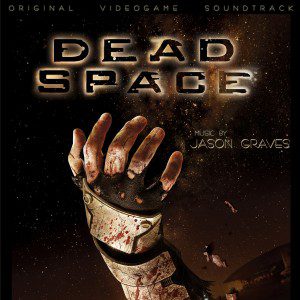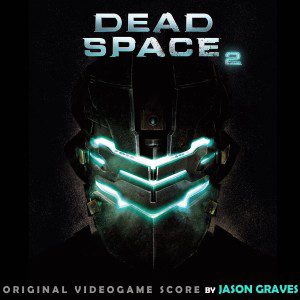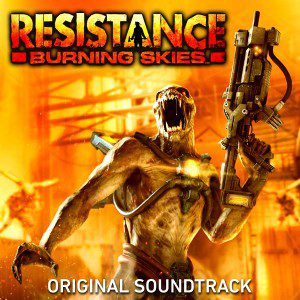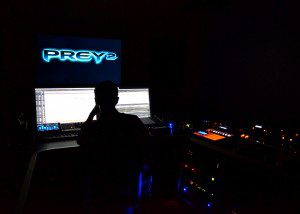Jason Graves is an award-winning American television, film and video game music composer. He is more recently known for his musical score for Dead Space, a survival horror-action video game.
What was the first soundtrack or composition that you listened to and how did it affect you?
The first thing I heard that really made an impact on me as a kid was the score to E.T. The Extra-Terrestrial. The first and last ten minutes of the film have hardly any dialogue. Both of those scenes are entirely music-driven. While I didn’t realise it at the time, they were also the perfect example of music’s ability to emotionally drive the story home on an almost subliminal level.
 What was it that first attracted you to horror?
What was it that first attracted you to horror?
Is it crude to say “the paycheck?” Seriously, most of the project composers do or do not work on is simply a matter of if they were offered the gig in the first place. I didn’t really know what I was getting into with Dead Space, my first horror game. But what I came to find out was that it can be a lot of fun writing scary music!
Many times in music there are certain rules you need to follow in order to fulfill a specific scenario in a game or film. The only real rule in horror is that there aren’t any rules. In fact, if you go against the grain and try something new and different you not only end up with something more original, a lot of times it can be even scarier than you thought possible.
What are you working on now?
I’ve been in the throes of music production for Dead Space 3 for exactly a year now. I’ve also been working on Prey 2 for almost that long. There’s the City of Heroes MMO that calls for music every few months and I’m also constantly composing new music for Ubisoft’s Heroes of Might and Magic DLC. I’ve got an unannounced horror title coming out next year plus a thriller/mystery game along with another big title I’ve been sworn to secrecy about. And I just started ramping up production on a new IP for a major publisher that’s looking very promising on the creative front.
What achievement are you most proud of?
I’ve found that it’s not really a point of pride as much as it is a matter of being creatively satisfied. That’s where a major difference between films and games lies for me. By that logic, any titles that allow me to flex those creative muscles and truly be a part of the game development team could count as projects I’m proud of. The Dead Space series is the first that comes to mind, simply because it was literally something I had never done before in games. I’m not really sure if anyone had approached music in a game that way before. That’s what keeps me happy and looking forward to the next day of composition – trying new things and breaking new ground creatively.
Who do you admire musically?
Most of the composers I look up to are all dead! That may make it slightly difficult for a one-on-one conversation, but fortunately composers’ scores remain long after they’re gone. One of my favorite things to do is pull a score from the bookcase and pour over it, looking for clues or ‘advice’ on counterpoint, orchestration, harmony or even somatic development. A short list of my favourite classical composers would have to include Tchaikovsky, Stravinsky and Penderecki. In the film world, I would be remiss not to mention Bernard Herrmann, Jerry Goldsmith, John Williams and more recently Marco Beltrami.
 Talk us through your musical training and background.
Talk us through your musical training and background.
I’ve been playing piano and banging on things since I can remember. I was obsessed with music in high school but never really thought about it as a career until college, where I started as a music education major and quickly switched to music composition simply because I couldn’t stand playing brass instruments! Seriously, you had to take method classes and learn rudimentary skills on each one, which makes sense if you’re going to be a band director.
So I switched to music composition. The composition professor was also the percussion instructor and I was a percussion major, so it was a good fit. He also taught Steel Band, African Ensemble, Mid-East Ensemble and the electronic music ensemble so I played in all of those. He was also very much into 20th Century advanced music techniques so I ate that up as well. And here I am, twenty years later, surrounded by world percussion that I record on my scores every day in my electronic music studio, composing a fair portion of advanced, aleatoric orchestral compositions!
I also attended the University of Southern California’s Film and Television Music programme, where I made some good connections and accrued a long list of television shows, commercials and films in a very condensed time frame. I quickly learned to compose on a deadline with many different simultaneous projects, all the while running on very little sleep and lots of caffeine.
What influences you when writing music?
It always comes down to the gameplay and trying to figure out what the main character is feeling at that moment. Certainly there are other influences – design, artwork, gameplay features, time period, subject matter, etc. The last few years I’ve been lucky enough to be asked to build scores for bigger games literally from the ground up. That is to say, developers aren’t coming to me with example music tracks of what they want their games to sound like. It’s a lot more of an open dialogue and I’m able to start with a clean slate for each project and try to create something original.
Does writing music for games differ from writing for film and television? Are there any specific difficulties?
The two major differences would be the technical side of music composition and the number of minutes required for a film versus a game. Film is a lot more straightforward. It’s a linear medium so any scene will play the exact same way every time you watch the film. The opposite holds true for video games. A well-crafted game will have branching stories, multiple plots and even alternate endings based on the player’s choice. The music playing behind the game needs to be able to adapt in real time and follow the action as it progresses on screen.
The second key difference between film and games deals with the impetus behind each. There may be some big set pieces in the film with lots of action and not much dialogue, but taken as a whole all film is dialogue-driven. You’re watching the movie and listening to people talk as the plot unfolds. Games, on the other hand, are action-driven. Again, there may be some big set pieces in a game with lots of dialogue and not much action, but taken as a whole most games are action-driven. It’s all about the player’s character and what they are doing. For music, this translates into having a lot more latitude with score if you’re working in a game. You are able to take more liberty with the music; there is hardly any dialogue. Whereas with film, you’re constantly trying to not ‘step on the dialogue’. There’s nothing worse than watching the film and not being able to understand the dialogue because the music is too loud!
Do you get to play the games first for inspiration?
Many times, yes I do. A lot really depends on what stage the game is in development. A best case scenario would involve me visiting the developer on a fairly regular basis to sit down, face-to-face, and play though the game. However, sometimes that’s not possible. An adequate substitution, though definitely not as fun, is receiving QuickTime captures of the gameplay. Then the audio director and I play the movie in each of our studios and discuss the music over the phone or Skype.
Some of the best inspiration actually comes from being able to play the game once the music has been correctly implemented. It’s almost like a musical shot in the arm, because a well-implemented score can mean the difference between the life and death of your music. Or at least the way it is heard and perceived by gamers in the game!
What has fan reaction been like to the music you’ve written? Do gamers take time out to write to you?
I find myself very fortunate to have people contact me on a daily basis to talk about music, gear, sample libraries, or anything else we (as composers) find ourselves having to deal with all the time. Production schedules can be demanding at times but I try my hardest to personally answer questions and respond to messages from fans. I am just a fan myself! I would love to be able to post a question on Tchaikovsky’s Facebook page and get an actual response from the composer himself.
 Your latest project, Resistance: Burning Skies has music by both yourself and Kevin Riepl. Did you get allocated different parts of the game to work on or did you split the work up between yourselves?
Your latest project, Resistance: Burning Skies has music by both yourself and Kevin Riepl. Did you get allocated different parts of the game to work on or did you split the work up between yourselves?
Due to the quick turnaround of the score and the fact that we needed to record the entire thing with a live orchestra, Sony predetermined the cue assignments for each of us. There was over an hour of music that needed to be recorded in less than 4 weeks time. The fact that Sony had a music production plan in place already allowed us to execute it as quickly as possible and be prepared for the session. It really made all the difference in the world!
Could you recommend a score for our readers?
To me, Jerry Goldsmith’s Alien is still the seminal horror score for film. But if you really want to go to the original roots of every horror film score that’s ever been written, you need to listen to Krzysztof Penderecki’s music. The two pieces that come to mind immediately are Threnody to the Victims of Hiroshima and Polymorphia. Excerpts from these pieces were used in such classic horror movies as The Shining and The Exorcist.
JOHN LLEWELLYN PROBERT
—
If you enjoyed our interview with Jason Graves and would like to listen to his scores, please consider clicking through to our Amazon Affiliate links and purchasing a new CD today. If you do you’ll help keep the This Is Horror ship afloat with some very welcome remuneration.











1 comment
I loved music as a child too and I still do today, and I am finding that there are all kinds of writing projects that I hardly ever noticed where there before, until I started writing myself and I find it absolutely amazing! I remembered writing a small song for my late mother years ago as a preteen and some of it I can still remember today, but writing for games didn’t come to my attention until I wrote my first excerpt for the spider. I have to say that music has and will always be my favorite. I played the hardest instrument there was to play in the high school band, the flute, but for me it was lovely.